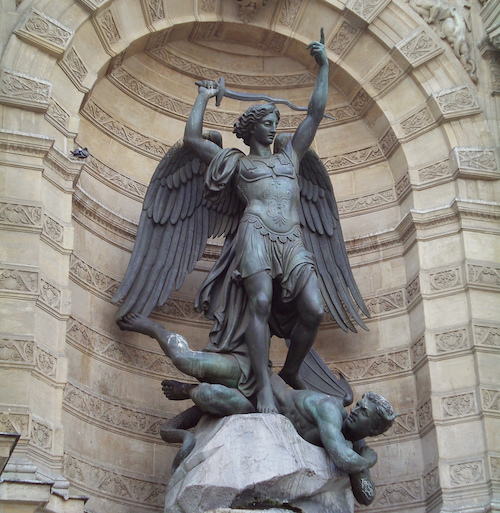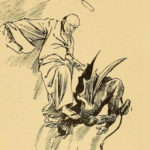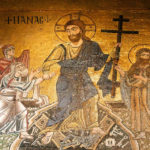We run our website the way we wished the whole internet worked: we provide high quality original content with no ads. We are funded solely by your direct support. Please consider supporting this project.

The Most Quoted Old Testament Verse
No other passage from the Old Testament is quoted more by New Testament authors than Psalm 110:1. Its frequent citation should cause us to pay attention to what is being said. It reads:
The Lord says to my lord, “Sit at my right hand until I make your enemies your footstool.”
In David’s day, it was common for a king to symbolize his conquest of another kingdom by using the defeated ruler’s neck as a footstool. In this Psalm, we have a prophesy that is proclaiming that the Messiah would rule at the “right hand” of God—this is a metaphor that symbolizes power—until he subjugated his enemies by putting his foot on their necks.
In almost every instance, the NT authors associate this verse with Christ’s death and resurrection. For instance, Peter proclaims in the first sermon after Jesus’ ascension:
This Jesus God raised up, and of that all of us are witnesses. Being therefore exalted at the right hand of God, and having received from the Father the promise of the Holy Spirit, he has poured out this that you both see and hear. For David did not ascend into the heavens, but he himself says, “The Lord said to my Lord: ‘Sit at my right hand, until I make your enemies your footstool.’” (Acts 2:32-35)
Then he concludes the sermon:
Therefore let the entire house of Israel know with certainty that God has made him both Lord and Messiah, this Jesus whom you crucified. (Acts 2:36)
Peter is depicting the significance of Christ’s death and resurrection as centering on the way it fulfills Ps 110:1. By raising Christ from the dead, the Father has made his Son “both Lord and Messiah,” and has now set him at “his right hand” so he can reign over his enemies until they are made his footstool. In this sense, the death and resurrection of Jesus was, for Peter, first and foremost an act of war.
Paul expresses the same conviction in the first letter to the Corinthians. In a passage about the final resurrection, Paul states:
For as all die in Adam, so all will be made alive in Christ. But each in his own order: Christ the first fruits, then at his coming those who belong to Christ. Then comes the end, when he hands over the kingdom to God the Father, after he has destroyed every ruler and every authority and power. For he must reign until he has put all his enemies under his feet. (1 Cor 15:22-25)
The resurrection enthroned Jesus over every ruler, authority, and power, and when they are finally destroyed, the goal of the incarnation, death, and resurrection of the Son of God will be achieved.
The death and resurrection of Christ was, for Paul, most fundamentally a decisive act of war initiated by God against everything that opposes him. It put Christ in a position above all demonic powers, and he shall continue to battle from this exalted position until every one of these powers has been destroyed.
The book of Hebrews also quotes this Psalm, noting that Jesus is superior to all angelic powers because it was to him, not to them, that the Father offered to “sit at my right hand until I make your enemies a footstool for your feet” (1:13). In chapter 10, we read that this enthronement occurred only because of Jesus’ sacrifice on the cross (10:12-13). We again see that Jesus’ death and resurrection were the means by which he gained the decisive upper hand over the enemies of God.
The central point is this: the work of the cross and the resurrection is about dethroning a cruel, illegitimate ruler and reinstating a loving, legitimate one: Jesus Christ. While this is not fully realized as a completed act, it has already been accomplished in principle through the cross and resurrection of Jesus, through which God stripped Satan and all levels of demons of all their power (Col 2:15). Therefore Christ now reigns in the power of God far above all such demonic powers. All things are already “under his feet.”
—Adapted from God at War, pages 242-246
Photo credit: Michel Hébert via VisualHunt.com / CC BY-SA
Category: General
Tags: Atonement, Cross, Power, Salvation, Spiritual Warfare, Warfare Worldview
Related Reading

Six Theses of the Warfare Worldview
The trinitarian warfare worldview seeks to reconcile our experience of radical evil with the conviction that reality is created and sustained by an all-loving, all-powerful God. Six principles form the foundation for this view. These principles are based on Scripture’s account of God’s battle with Satan as well as our experience with the war-zone reflected…

Podcast: How Much ‘War’ is there in Spiritual Warfare?
Greg considers violence in the spiritual realm. http://traffic.libsyn.com/askgregboyd/Episode_0241.mp3

Open Theism: A Basic Introduction
On Monday and Tuesday, Greg explained Molinism and contrasted it against the open view of the future. (Click here for part 1). Because many see the open view as a limited view of God, it’s helpful to be clear that this has less to do with the nature of God and is about the nature…

Atonement, Christus Victor & Aslan
No one illustrates this Christus Victor view of Christ’s work on the cross more beautifully than C.S. Lewis in his famous fantasy, The Lion, The Witch and the Wardrobe. The gist of the story is that four children find their way into another world called Narnia through a magical wardrobe. They quickly learn that an…

How the Anabaptists Emphasized the Cross
Because the Anabaptists have generally emphasized faith that is evidenced by works and thus on Jesus’ life as an example to be followed, it may prima facia appear that the saving work of the cross was less central to the early Anabaptists than it was to the Reformers and to Evangelicals. In reality, I would argue,…

A Christus Victor AND Penal Substitution View of the Atonement?
Hello fellow spiritual pilgrims, Just flew back from a two day visit to Whitworth University in Spokane Washington. Twenty years ago I almost entered a 50 mile trail race in Spokane that’s held every fall, but a lingering knee injury kept me out. The race was billed as the most beautiful trail race in the…
